Adopted by 193 countries in 2015, the United Nations Sustainable Development Goals (SDGs) marked the first time the global community agreed on an actionable agenda with priorities, goals and targets that include all countries and all citizens. As members of the knowledge sector, higher education institutions have a unique role and responsibility in advancing the SDGs. Not only is there much work to be done to achieve the 169 targets defined under the 17 goals by 2030, but, in our current context, achieving some of the goals will preclude success on others. Building on the core strengths of research, teaching, and service, higher education institutions can develop innovative solutions and partnerships for the SDGs, while empowering the next generation of citizens, consumers, constituents and leaders.
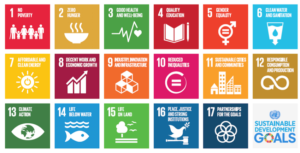 When the goals were announced, there was ample discussion of the need for 17, the finite wording of the goals, the impossibility of achieving all of the stated targets and the need to engage a broad variety of stakeholders from all sectors and at varied scales. This sparked curiosity about how Yale’s teaching and research might directly connect to the goals. We established an interdisciplinary team of students to compare the biographies, syllabi and websites of all 4,400+ Yale faculty members against the SDGs. Our initial aims were to identify pathways for collaboration between disciplines and highlight the expertise Yale might lend to the process of achieving the SDGs. Our secondary purpose was to substantiate the rationale for thinking of higher education sustainability beyond operational commitments such as recycling and turning off the lights.
When the goals were announced, there was ample discussion of the need for 17, the finite wording of the goals, the impossibility of achieving all of the stated targets and the need to engage a broad variety of stakeholders from all sectors and at varied scales. This sparked curiosity about how Yale’s teaching and research might directly connect to the goals. We established an interdisciplinary team of students to compare the biographies, syllabi and websites of all 4,400+ Yale faculty members against the SDGs. Our initial aims were to identify pathways for collaboration between disciplines and highlight the expertise Yale might lend to the process of achieving the SDGs. Our secondary purpose was to substantiate the rationale for thinking of higher education sustainability beyond operational commitments such as recycling and turning off the lights.
It took 14 interns 2.5 years to collect 128,528 data points. As of this writing, we have a matrix that catalogs 4,435 faculty members, and shows that every department at Yale has at least one faculty member whose scholarship relates to the SDGs. Solid representation across the goals was not surprising for some academic groups – such as the School of Forestry & Environmental Studies – but a gratifying discovery was the ample connections we found in areas that might not seem intrinsically connected to sustainable development – such as the Classics Department and the School of Drama. The dataset also illustrates that Yale’s teaching and research connects to each SDG, though some goals are covered more concretely than others: perhaps not surprisingly for a research university with a hospital, our strongest showing is SDG 3, Good Health, with 2,822 faculty members. SDG 4, Quality Education, and SDG 16, Peace, Justice and Strong Institutions, additionally have high faculty representation. Our poorest connections are to SDG 2, Zero Hunger, and SDG 14, Life Below Water.
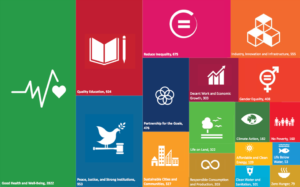
Now finished with the data collection, the Office of Sustainability is using the data to generate departmental and multidisciplinary SDG reports. The next stage for this project is a series of key informant interviews with departmental leadership to ground-truth the findings.
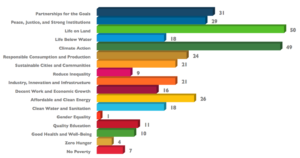
Building on this internal review, through the International Alliance of Research Universities (IARU) Yale is leading a program to explore the role of higher education institutions in advancing the goals. In June 2018, members of IARU organized and led a half-day session on this topic at the annual conference of the International Sustainable Campus Network. The event was organized in four tracks:
- Scholarship for solutions: teaching and research in the context of the SDGs.
- Walking the talk: how campuses can lead by example in terms of operational excellence and using the campus as a test bed for innovation.
- Next generation innovation: the role of students in advancing world-changing ideas.
- Service for society: universities as thought-leaders and collaborative partners in addressing global challenges.
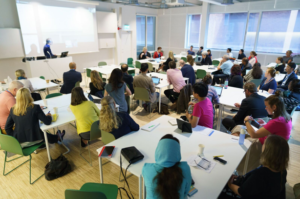
This program featured presentations from 12 universities from around the globe and a keynote address by Jeffrey Sachs, Director of the Sustainable Development Solutions Network and Director of the Center for Sustainable Development at Columbia University.
We brought students from four IARU member institutions – Yale University, University of Cape Town, University of California, Berkley and University of Oxford – to act as rapporteurs and develop a report on the event. In addition to their official tasks, these fellows have been asked to document their experience as a cohort through a IARU blog post.
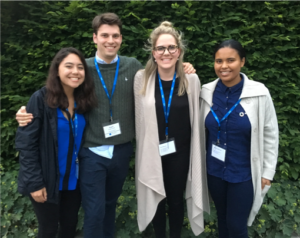
With just 12 years to achieve the global goals it is vital that higher education institutions harness their core strengths to catalyze progress. The Yale AASHE presentation, Global Priorities, Educated Solutions: the role of Academia in Advancing the SDGs, will offer an overview of the methods and outcomes of the initiatives mentioned here, followed by discussion of next steps to foster dialogue, innovate, measure, report and develop solutions for the SDGs. We look forward to having you join the conversation!
Want to learn more? Interested in developing solutions for the SDGs? Join us for the Global Priorities, Educated Solutions: the role of Academia in Advancing the SDGs session at the AASHE 2018 Conference & Expo – Wednesday, October 3, 10:45 – 11:15 a.m.